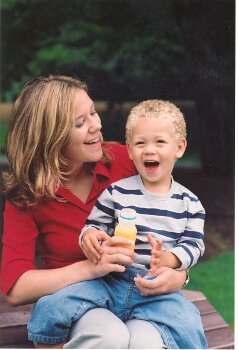Connecting through giggles and tears.
Emotional moments, whether happy, sad, or fearful, are when kids naturally turn to you for support. How you deal with these moments can help your child learn how to handle strong feelings now and in years to come.
When a child is filled with giggles or overwhelmed with tears, use these times as opportunities to help your child recognize emotions and grow closer. Feelings are not something to be ignored. By responding with patience, empathy, and understanding, you can help your child:
- Learn self-control
- Build self-confidence
- Do better in school
- Get along with others
Laughing along with a child is easy, but handling an angry child can be quite a challenge. You might feel uncomfortable and frustrated. He may be confused or overwhelmed. Dismissing his feelings as silly or unimportant or responding with threats or bribery will not help.
Understanding a child’s feelings may take some detective work and patience. After all, he may not understand his own feelings either. But being close and letting him know you care will help him to feel secure in expressing his feelings.
“I know how you feel.”
Take the time to listen to your child and understand her feelings. Help her to identify her feelings with words she can use, like “angry,” “hurt,” or “frustrated.” By talking about emotions early and often, you help children learn how to handle their feelings at home, school, and for the rest of their lives. It takes years to learn to understand and react well to our feelings – especially strong feelings and changing moods. By valuing emotions, you are teaching your kids that feelings count.
Later is better than not at all.
Life’s busy, and as hard as you try, not every parenting moment is perfect. In fact, if you respond to your child most of the time, you’re doing great.
And if there isn’t time to deal with strong emotions at the moment, don’t hesitate to come back later in the day and say to the child, “I didn’t feel very good about this morning. You seemed upset, and I didn’t take the time to ask you what was wrong.” If you recognize a child’s feelings, she knows you care.
Helpful parenting tips
Parents who take the time to listen, understand, and teach during emotional moments do themselves and their children a lot of good. Here are some things you can do:
- Be aware of your children’s feelings so that you can tell when they are mad, afraid, sad, or happy.
- Notice how they use their facial expressions, gestures, and voice to tell you when they are upset, sad, or happy.
- Provide some “emotional first aid” by letting your children know that:
- You care for them – no matter what they are feeling.
- They are not alone – you are there to help.
- You understand their feelings – you have felt that way too.
- It’s okay to have the feelings they have.
- Don’t dismiss or ignore your children’s feelings; talk about them in a patient, caring way.
- Gently encourage your child to talk about how he is feeling and why.
- Help them think of solutions to the situation – and let them suggest their own ideas.

